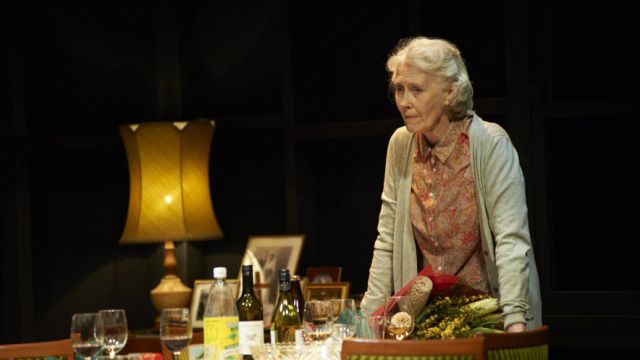National Interest
The Balibo Five story is well-known to Australians, especially since a coronial investigation in 2007, which confirmed the long-held suspicion that the journalists had been murdered by Indonesian forces in Balibo, East Timor in 1975. Then came the film, Balibo, and now Aidan Fennessy's play, National Interest, making its Melbourne debut with MTC this month.
As a news story, it is big: five Australians, news crews from Channels 7 and 9, killed while on an assignment to film an Indonesian insurgency into East Timor, a tiny country fighting for independence. It not only devastated the families, but was a test of Australian diplomacy: one that we failed, considering the many years it took for the truth to come out.
Fennessy explores the story through the eyes of June Stewart (Julia Blake), a mother of the deceased sound-recordist Tony Stewart from Channel 7. In a flawless performance, Blake portrays June as a strong woman who has found a way to cope with the tragedy and the injustice. In one of the play's most powerful moments, June tells her daughter Jane (Michelle Fornasier) why she doesn't want to hear another inquiry or report. She knows all the facts except one crucial detail about her son. It's a detail that no judge or politician or police officer has ever been able to tell her. It's a heartbreaking moment, and gets to the heart of the tragedy. The Balibo story is so big, as June explains, it is overwhelming.
A large part of the play is dominated by ghosts of three of the men, who inhabit June's home, still dressed in their 70s civilian clothes. The ghosts represent June's son Tony (played by James Bell), and his Channel 7 colleagues Greg Shackleton (Stuart Halusz) and Gary Cunningham (Grant Cartwright). The three actors all look like the black and white photos of the slain newsmen, which makes it eerie to see them walking through June's house. June sits back, aghast, while the ghosts re-play their risky journey to Balibo, the many warnings they were given to turn back, their fears for their lives, and determination to stay to film the impending incursion by the Indonesians. There is a barrage of material about the case acted out by the ghosts, and it starts to become heavy handed. We hear snippets from news stories, speeches, findings, reports, describing various aspects of the deaths, especially Australia's (lack of) response to it. Another layer is added by the Coroner (Polly Low), who gives her findings over June's kitchen table.
While the ghost story is enthralling and at times shocking, it starts to overwhelm June's personal story. June changes her stance about going to Balibo towards the end of the play, and it isn't clear what brought about this change. The most powerful moments are the subtle ones, where we're reminded of a mother who lost a son, and three young men in their 20s who thought they'd be protected from violence just because they're Australian.
National Interestis heavy handed at times but still makes a powerful statement about grief and Australia's place in the world.
Sara Bannister
Image: Julia Blake (June Stewart). Photographer: Gary Marsh
Subscribe to our E-Newsletter, buy our latest print edition or find a Performing Arts book at Book Nook.

